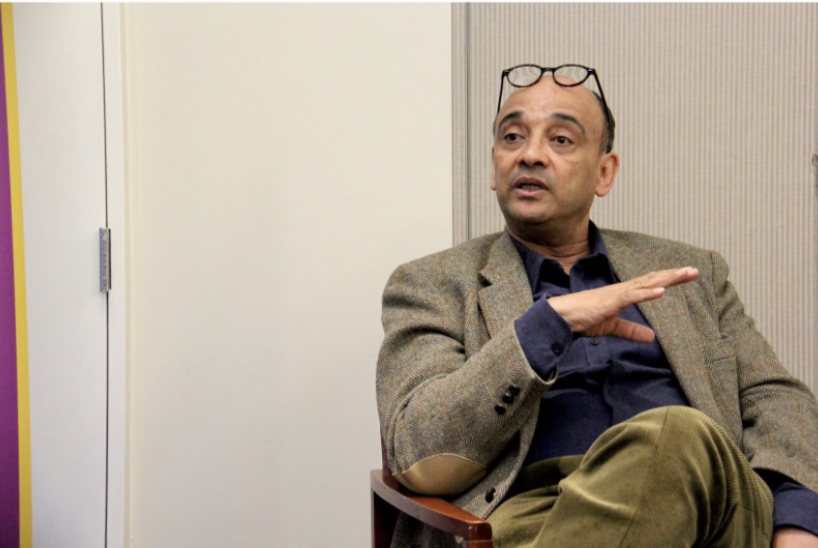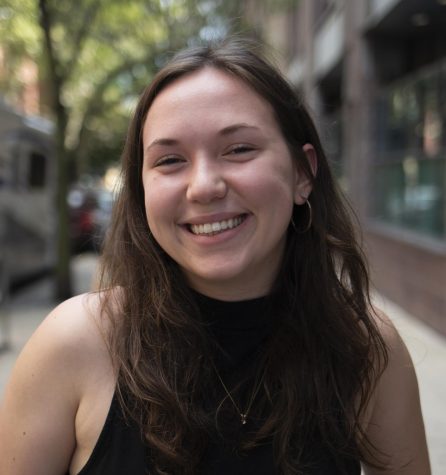New York Times Columnist Discusses Identity at NYU Review and Debates
NYU professor Kwame Anthony discusses identity as a part of The Review and Debates of NYU.
April 13, 2018
On Wednesday, The Review and Debates at NYU welcomed renowned philosopher and Professor of Philosophy at NYU Law Kwame Anthony Appiah to speak on the topic of identity.
Appiah has taught at Yale University, Cornell University, Duke University, Princeton University and Harvard University. He currently writes the weekly ethics column for The New York Times — called The Ethicist— and sits on the board of the American Academy of Arts and Sciences, the American Academy of Arts and Letters, the New York Public Theater and the New York Public Library. In 2012, former President Barack Obama presented him with the National Humanities Medal. The event brought in over 50 students and older residents of New York City; an instant hush fell over the crowd when Appiah walked up to the podium to speak.
During the event, Kwame explored the ways in which society characterizes itself — through religion, race, class and other verticals — and how these roles function. President of the Review and Debates club and CAS senior Akash Lodh spoke to the relevancy of the topic.
“We as a club try to ask questions that matter, and amidst strong movements around the world asserting various concepts of identity, we found ourselves asking how people define themselves and how that translates to the ways they view themselves and others,” Lodh said to WSN. “We wanted to explore the intersection of identity and politics, and host someone who challenges some of the ways identity is commonly conceived today.”
During the Q&A between Lodh and Appiah, Appiah discussed how the concept of identity shapes international relations and the importance of acknowledging common stereotypes that may arise.
“When something happens in the domain of international relations, the first thing we do is categorize people as something,” Appiah said. “I think careful reflection of what is and isn’t entailed by for example, religious identity is a really important part in thinking sensibly about how to operate in both domestic and international politics.”
When making decisions in politics and beyond, Appiah affirmed that conversations between both policy makers and scholars are increasingly important to keep these stereotypes from overriding decisions.
“The idea that there is something that’s at the core of being [a certain religion or race] I think is a mistake,” Appiah said. “It [leads] people to have stereotyped expectations of people when they’re given these labels. I think it’s important and helpful for intellectuals to remind the policy people that they’re making mistakes when using those categories in that way.”
Appiah also disagreed with the modern criticisms of cultural appropriation. Citing the Japanese poet Bashō, known by literary scholars as the father of the haiku-prose form, Appiah said that without Bashō’s experience as a Zen Buddhist, a religion that originated in India, Bashō’s might have never become one of the most prominent haiku writers. Appiah insisted that borrowing from other cultures is not necessarily a bad thing, as long as it does so respectfully.
“I’m not sympathetic to the basic theoretical idea of cultural appropriation. However, in many contexts, what people are talking about when they criticize something as cultural appropriation is something else,” Appiah said. “It’s the exploitation of people and exploitation is wrong, taking advantage of people’s vulnerabilities is wrong, and if you do so in the context of making art its wrong, and similarly some appropriation is insensitive and insulting.”
“The idea that the things we care about could survive if we police the identity boundaries, if we said men can only write about things done by men of their own culture and identity, women can only write about things done by women of their own race and class, well I’d shoot myself,” Kwame said. “There’d be almost nothing worthwhile left.”
CAS sophomore Maahnoor Siddiqui said after the event that she understood the basis of Kwame’s argument but has a different view.
“I see how culture can flow and borrow but there’s a difference in taking elements,” Maahnoor said. “I think he doesn’t get the point that appropriation is taking something that you put down previously. There’s a difference in borrowing elements and honoring it and taking it and disrespecting it, and I think that’s a distinction he needs to point out.”
Email Kristina Hayhurt at [email protected]

























































































































































